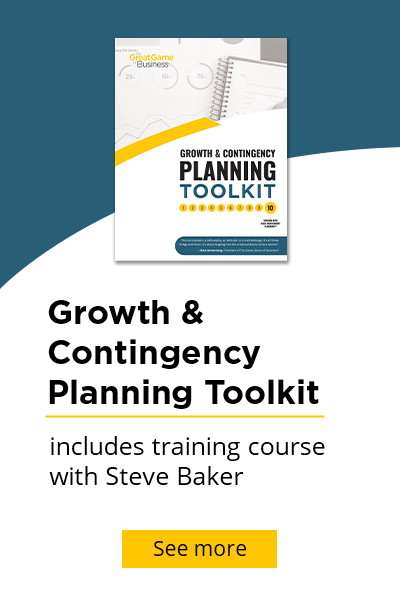.png?width=790&name=The%20Coaches%20Corner%20Tips%20For%20Construction%20(1).png)
In this recording of the coaches' corner, hosted on our online membership platform, 3 of our coaches discuss issues currently facing the construction and remodeling industry. They cover challenges their clients are facing today and how The Great Game of Business can be used to help mitigate some of those issues.
Learn How To Stay Ahead of Your Business With Strategic Planning
Using The Great Game of Business to Mitigate Challenges In Business
Start with Strategy — What are you going to do to make sure you outperform your competitors within areas your industry typically struggles? What is an aspect of your business you could capitalize on by becoming THE BEST at that one thing?
Track, Measure, and Report — Whatever gets measured and reported, gets improved. (Ask yourself what you can control and scoreboard to encourage improvements) See examples of scoreboards here.
Look at Trades and Partners — Companies that work closely with partners and suppliers can fall victim to the performance of those partners. Make sure you're not losing money due to poor performance of partners.
.png?width=100&name=Coachs%20Tip%20Chat%20Bubble%20(1).png) Coach Tip:
Coach Tip:
For one company in the home building industry, a one-day delay from their supplier equated to $3,000! If that supplier is late 70 days over the course of 15 homes in a year, that's $210,000. How can that $210,000 you're spending on delays be used differently? One way clients are using The Great Game of Business, is to adopt the practice of MiniGames (short-term challenges to improve a weakness) with trade partners to help stay on schedule and avoid delays.
Scheduling — Use technology or an additional office person to help manage communications on the job and scheduling with trades and suppliers.
Pricing and Margins — Volatility produces opportunities. There's a lot of shifting in the market right now, and it's challenging to know the best way to structure pricing. One of our coaches suggested looking back at the High-Involvement Planning process. Evaluate what your true sales and growth strategies are to help determine long-term plays to be taking advantage of that align with your strategy for growth. GET DATA to help inform your pricing decisions.
Become the Customer of Choice — Use the strategy of becoming the customer of choice. You want mutually beneficial partnerships. Pay your partners what they need to be profitable and don't try to short them. Work with them to be able to give them great terms. Open the lines of communication and try having conversations around long-term partnerships. Sometimes those long-term agreements can bring opportunities. If you can become the customer of choice for those partners, they will WANT to continue to do business with you and you can start to build those mutually beneficial partnerships.
Adapt — Adapt, adapt, adapt. Always be adapting. Ask yourself what you can do today and this week to set yourself up on the P&L.
Learn more about business planning at our workshop. Get the help you need to build a business plan you and your team feel confident about!
.png)








.png)




-5.png)

